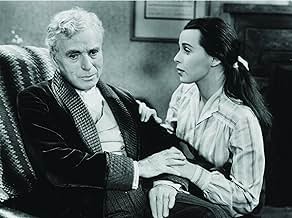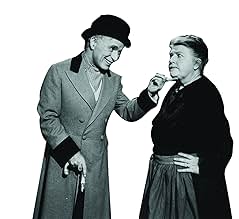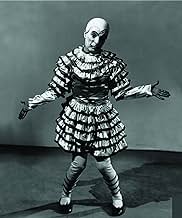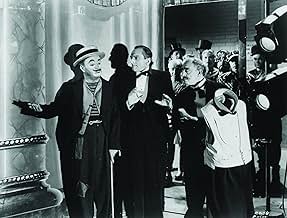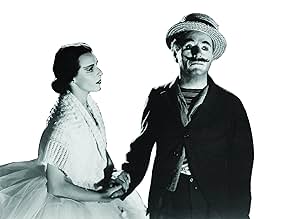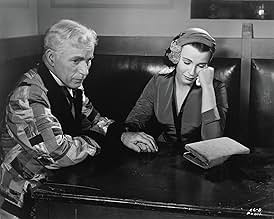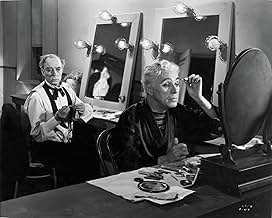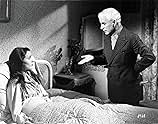IMDb-BEWERTUNG
8,0/10
23.396
IHRE BEWERTUNG
Ein alternder Komiker und eine suizidale Balletttänzerin kümmern sich umeinander und finden so wieder Hoffnung und einen Sinn in ihrem Leben.Ein alternder Komiker und eine suizidale Balletttänzerin kümmern sich umeinander und finden so wieder Hoffnung und einen Sinn in ihrem Leben.Ein alternder Komiker und eine suizidale Balletttänzerin kümmern sich umeinander und finden so wieder Hoffnung und einen Sinn in ihrem Leben.
- 1 Oscar gewonnen
- 7 Gewinne & 4 Nominierungen insgesamt
Molly Glessing
- Maid
- (as Mollie Glessing)
Leonard Mudie
- Dr. Blake - Calvero's Doctor
- (as Leonard Mudi)
'Snub' Pollard
- Street Musician
- (as Snub Pollard)
Billy Lee Aimone
- Little Boy
- (Nicht genannt)
Empfohlene Bewertungen
This was the first and only Chaplin film I have ever seen -- and it wasn't at all what I was expecting.
I was completely surprised that such a simple film could have so many layers of depth. In fact it kept me thinking days afterwards!
At it's core, I would say this movie is about the love of one's art, and the love that a couple share.
The Ballerina loves to perform but is impeded by a psychosis that makes her legs inoperable. I interpret success to be the root of the psychosis.
The Clown loves to perform but is impeded by his fear of becoming a B or C-list star. He is a legendary comedian and now that he's no longer in demand, he's convinced himself that he has to drink to be funny.
There you have it; a clown afraid of failure and a ballerina afraid of success. Together they help each other love their art more by removing those things that impede them.
The best thing about the film is that the obviousness of the plot is completely lost in the depth of the film. Chaplin uses such simple and common devices to draw the audience into his world. I know it's hard to belive, but this is a "must-see" movie!
I was completely surprised that such a simple film could have so many layers of depth. In fact it kept me thinking days afterwards!
At it's core, I would say this movie is about the love of one's art, and the love that a couple share.
The Ballerina loves to perform but is impeded by a psychosis that makes her legs inoperable. I interpret success to be the root of the psychosis.
The Clown loves to perform but is impeded by his fear of becoming a B or C-list star. He is a legendary comedian and now that he's no longer in demand, he's convinced himself that he has to drink to be funny.
There you have it; a clown afraid of failure and a ballerina afraid of success. Together they help each other love their art more by removing those things that impede them.
The best thing about the film is that the obviousness of the plot is completely lost in the depth of the film. Chaplin uses such simple and common devices to draw the audience into his world. I know it's hard to belive, but this is a "must-see" movie!
Permeated with profound melancholy, told with a wistful eye and heavily autobiographical in its depiction of events, Limelight concerns a fading comedian who's forced to deal with the loss of his popularity but finds purpose & hope by helping out a suicidal dancer. Anchored by excellent performances, the film is a powerfully moving & deeply personal effort from the great visionary.
Written, produced, directed & also composed by Charlie Chaplin (A Woman of Paris & Monsieur Verdoux), the story borrows ideas & events from the acclaimed filmmaker's own past & present life and finely balances hope with despair, stardom with obscurity, happiness with heartbreak & laughter with tears. It captures the power of kindness, the beauty of companionship & is an ode to life itself.
Chaplin also stars as the washed-out music hall comedian whose lost fame alludes to his own decreased popularity in the United States and the gaze, gestures & expressions with which he articulates his poignance & longing has a pitch-perfect conviction to it. Claire Boom is brilliant as well and her performance only gets stronger as plot progresses. And the two share a warm, wonderful chemistry together.
Overall, Limelight presents Charlie Chaplin making peace with his glorious past, acknowledging & accepting the realities of his place in the present world, and looking forward to his future with renewed hope. There are plenty of impressive scenes in this film but the most memorable one is where cinema's two greatest comedians unite for a gag together: a final coda on the stage that once was the playground of these screen legends.
Written, produced, directed & also composed by Charlie Chaplin (A Woman of Paris & Monsieur Verdoux), the story borrows ideas & events from the acclaimed filmmaker's own past & present life and finely balances hope with despair, stardom with obscurity, happiness with heartbreak & laughter with tears. It captures the power of kindness, the beauty of companionship & is an ode to life itself.
Chaplin also stars as the washed-out music hall comedian whose lost fame alludes to his own decreased popularity in the United States and the gaze, gestures & expressions with which he articulates his poignance & longing has a pitch-perfect conviction to it. Claire Boom is brilliant as well and her performance only gets stronger as plot progresses. And the two share a warm, wonderful chemistry together.
Overall, Limelight presents Charlie Chaplin making peace with his glorious past, acknowledging & accepting the realities of his place in the present world, and looking forward to his future with renewed hope. There are plenty of impressive scenes in this film but the most memorable one is where cinema's two greatest comedians unite for a gag together: a final coda on the stage that once was the playground of these screen legends.
Charles Chaplin stars as Calvero, an alcoholic, washed-up music hall comedian who saves a rooming house neighbor from committing suicide when he passes by her door and smells gas. The neighbor, young ballet dancer Thereza (Claire Bloom), attempted suicide because she believes that she will never walk and therefore never dance again. She stays with Calvero while she recuperates, and the old comic starts to improve himself as he sets out to get Thereza the chance to prove herself as a world-class dancer. Thereza wants to marry Calvero in spite of their large age difference (I won't go into how art is imitating life here), but he feels that a young composer (Sydney Earl Chaplin) would be a better match. Complications ensue.
Chaplin's last starring role came in this bittersweet drama, a massive hit everywhere else in the world, but barely released in the U. S. due to Chaplin being labeled a "dangerous leftist". I had the same opinion of this that I did with many of his silent movies: it's technically proficient, but the sentimentality is a bit too thick, and it often seems blatantly phony, and not earned by what has been shown on screen. I've grown to like many of Chaplin's films on repeat viewings, and even love a couple of them, but I've always preferred the work of Buster Keaton. It was nice seeing the two on screen together, but it wasn't for long enough. The movie eventually received an Oscar-qualifying premiere in L. A. twenty years later, and thus bizarrely won the 1972 Oscar for Best Score (Charles Chaplin, Ray Rasch, and Larry Russell).
Chaplin's last starring role came in this bittersweet drama, a massive hit everywhere else in the world, but barely released in the U. S. due to Chaplin being labeled a "dangerous leftist". I had the same opinion of this that I did with many of his silent movies: it's technically proficient, but the sentimentality is a bit too thick, and it often seems blatantly phony, and not earned by what has been shown on screen. I've grown to like many of Chaplin's films on repeat viewings, and even love a couple of them, but I've always preferred the work of Buster Keaton. It was nice seeing the two on screen together, but it wasn't for long enough. The movie eventually received an Oscar-qualifying premiere in L. A. twenty years later, and thus bizarrely won the 1972 Oscar for Best Score (Charles Chaplin, Ray Rasch, and Larry Russell).
Chaplin could do anything as well or better than anyone else in movies: acting, writing, directing, composing, producing, editing, even choreographing. He was world renown as a comedian, yet has placed some of the most poignant images on film that ever were. He was, even more than the great Orson Welles, a sort of one man band.
He was as successful worldwide as anyone ever was in movies. Somehow in all this, he got the idea that he had something worthwhile to say about life and art. Which he did with this film.. and I for one am extremely grateful.
The subjects of alcoholism... depression... aging... the fickle relationships of audiences and performers... these are all covered in a film that manages to fit in philosophical dialog, pantomime, dancing, and music. The multiple showings of the same comedy sequence (in a dream, in front of an unappreciative audience, in front of a wildly appreciative audience) gets one to thinking about the lemming-like nature of people in a way that someone like Chaplin would have had almost unique insight into.
It may take a while to become accustomed to the odd pacing and cadence of a Chaplin movie; once you are, you find yourself in the middle of an artistic experience like no other.
The music in this film is unusually haunting and deserving of the Academy award it belatedly received. 10 out of 10.
He was as successful worldwide as anyone ever was in movies. Somehow in all this, he got the idea that he had something worthwhile to say about life and art. Which he did with this film.. and I for one am extremely grateful.
The subjects of alcoholism... depression... aging... the fickle relationships of audiences and performers... these are all covered in a film that manages to fit in philosophical dialog, pantomime, dancing, and music. The multiple showings of the same comedy sequence (in a dream, in front of an unappreciative audience, in front of a wildly appreciative audience) gets one to thinking about the lemming-like nature of people in a way that someone like Chaplin would have had almost unique insight into.
It may take a while to become accustomed to the odd pacing and cadence of a Chaplin movie; once you are, you find yourself in the middle of an artistic experience like no other.
The music in this film is unusually haunting and deserving of the Academy award it belatedly received. 10 out of 10.
Charles Chaplin plays Calvero, an aging clown who rescues a ballet dancer called Terry (Claire Bloom) from committing suicide.These two become friends and Calvero gets more meaning to his life.He desperately tries to make a come back to become the greatest clown again but it's hard to make people laugh anymore.Limelight from 1952 was Charles Chaplin's last American film.It was a flop but the film won an Academy Award for best score in 1972.That year the king of comedy got also a special Oscar for career achievement.This was Chaplin's most sentimental movie and it also was very touching.Chaplin is amazing as the aging clown.The man wasn't only a great comedian.He was also a terrific actor.It's hard to top his performance in this movie.Claire Bloom's performance as the ballet dancer is also brilliant.Chaplin's son Sydney plays Neville in the movie.There are also Chaplin's children Victoria, Michael, Josephine, Geraldine and Charles Chaplin Jr. in this film.This is truly a masterpiece.This proves that Chaplin didn't shine only in silent movies.He did that also in talkies.And this is one of his best talkies. The dialogue is just delicious in this comedic drama.In the end you can see another great comedian from the silent era;Buster Keaton.You can see Chaplin and Keaton clowning together in the end.And that is one great scene.A scene to remember.The message of Limelight is how wonderful life is.Enjoy it while you still can.
Wusstest du schon
- WissenswertesThe Academy Award that Sir Charles Chaplin won for composing this film's score is the only competitive Oscar he ever received; his other awards were given to him for special achievement outside of the established categories.
- PatzerIn discussing the ballet with the cast, the dance director Bodalink casts a giant shadow in front of the auditorium seats (revealing it to be nothing more than a backdrop).
- Crazy Credits"The glamour of limelight, from which age must pass as youth enters."
- Alternative VersionenThe version of the film that premiered in London in 1952 ran 141 minutes. It had been in distribution for several months, when Charles Chaplin recalled film prints and deleted a scene in which Calvero leaves the sleeping Thereza, and goes to a bar, where he meets his old friend Claudius, the arm-less violin player, who gives Calvero money. The film ran 137 minutes after this scene was edited out for worldwide distribution. In the ending credits, there is still a billing for Stapleton Kent as Claudius, even though he is no longer seen in the film. The DVD includes the deleted scene as an extra feature.
- VerbindungenEdited into Geschichte(n) des Kinos: Une histoire seule (1989)
Top-Auswahl
Melde dich zum Bewerten an und greife auf die Watchlist für personalisierte Empfehlungen zu.
- How long is Limelight?Powered by Alexa
Details
- Erscheinungsdatum
- Herkunftsland
- Offizielle Standorte
- Sprache
- Auch bekannt als
- Candilejas
- Drehorte
- Produktionsfirma
- Weitere beteiligte Unternehmen bei IMDbPro anzeigen
Box Office
- Weltweiter Bruttoertrag
- 9.291 $
- Laufzeit
- 2 Std. 17 Min.(137 min)
- Farbe
- Seitenverhältnis
- 1.37 : 1
Zu dieser Seite beitragen
Bearbeitung vorschlagen oder fehlenden Inhalt hinzufügen


